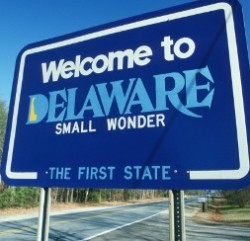Delaware Online Gambling Rises In April But Poker Lower

The Delaware Lottery has announced that its online gambling revenues were up by 6% to $240,496 for the month of April, compared to the $206,833 the state generated in March. In spite of the positive result it was online casino products which helped lift the state’s igaming revenues higher, while online poker took a dive last month.
On a more positive note, Delaware has seen its online revenues rise each month since its first site was launched back in November 2013, and the state’s latest tally represents its biggest total to date.
Revenue breakdown by games
In April, Delaware‘s online table games experienced an impressive 31% improvement in revenues to $137,205, while slots, too, were up by 6% to $29,214. Alternatively, internet poker saw its revenues plummet from $84,391 in March, to just $74,078 in April. Online poker now accounts for a third of Delaware’s overall igaming market.
Signalling a worrying trend for the industry, however, new igaming account signups have dropped off significantly since the state signed up 2,654 new players during its first full month of regulated online gambling. In April, Delaware subsequently attracted a mere 406 new players, representing five consecutive months of decline for the state.
Delaware Park now 75% of igaming market
Of the three gambling sites operating in the state, Delaware Park continues to be the dominant player with a huge 75% share of the market worth $180,900 in April. Next, Dover Downs generated $48,553 last month or 20% of the market, while Harrington Raceway continues to languish at the bottom with just 5% of revenues worth $11,042.
In terms of online poker, Delaware Park extended its share of the market from 65% to 69% in April, and while Dover Downs remained much the same at 26%, Harrington saw its share of the poker market nearly cut in half from 9% to 5%.
Delaware compared to other regulated markets
Delaware being the smallest of the three regulated igaming markets means it rarely attracts the same level of interest that either New Jersey or Nevada enjoys. Nevertheless, The Diamond State now holds the honour of being the only legal state to post continuing gains since launch, while in April both New Jersey and Nevada reported their first ever declines, with Nevada’s online poker-only offering diving 14.5% to $792,000 from the $926,000 generated in March, and New Jersey online gambling revenues down to $11,428,737 from $11,878,374. Once again, online poker was the main reason for the decline in NJ’s igaming market.
Still, Delaware with a state population of 900k people has a significantly smaller potential market than either New Jersey (9m) or Nevada (2.7m), reflected in its miniscule revenues. Nonetheless, online gambling revenues have been disappointing across the board and while New Jersey is confident it can go it alone for now, Delaware and Nevada see the way forward through interstate player sharing pools, like the one they signed at the end of February.
Disappointing results in all three states
In fact, so disappointing have online gambling revenues been compared to preregulation forecasts that it is believed this may have been the main reason other US states have thus far failed to throw in their lot and launch their own igaming industries. As a result, Poker Players Alliance Executive Director John Pappas was compelled to comment recently that:
“We need to be realistic when talking to lawmakers about what can be expected from iPoker revenue, particularly when looking at a state-by-state deal where individual states are operating. Until they can have interstate liquidity, I think they will always have lower-than-expected revenues.”
Liquidity sharing a lifeline for Delaware
Originally when Delaware and Nevada announced their landmark interstate compact, the two states did not expect the agreement to be enacted until the end of this year. The very next month, however, that assessment was revised to begin sometime this summer as the states sought to give their ailing online poker industries a more immediate shot in the arm.
In an attempt to allay the concerns of other potential states currently sitting on the fence in terms of online poker, Nevada has also offered to give them the benefit of its own experience in setting up all the necessary infrastructure for regulated internet gaming. As Nevada Governor Brian Sandoval, stating:
“If there are states that don’t have as sophisticated a regulatory structure as we have, that’s something we can offer. If your state doesn’t have the infrastructure, use our capabilities.”







